AI in Logistics Industry: Redefining Global Supply Chains
Manish Kumawat
Last Updated on: 29 September 2025
When you consider the services of a logistics company, moving products safely from a warehouse to the customers, the whole process is complex than we imagine. This complexity raises many challenges for the logistics business. AI in logistics is the best solution for these challenges.
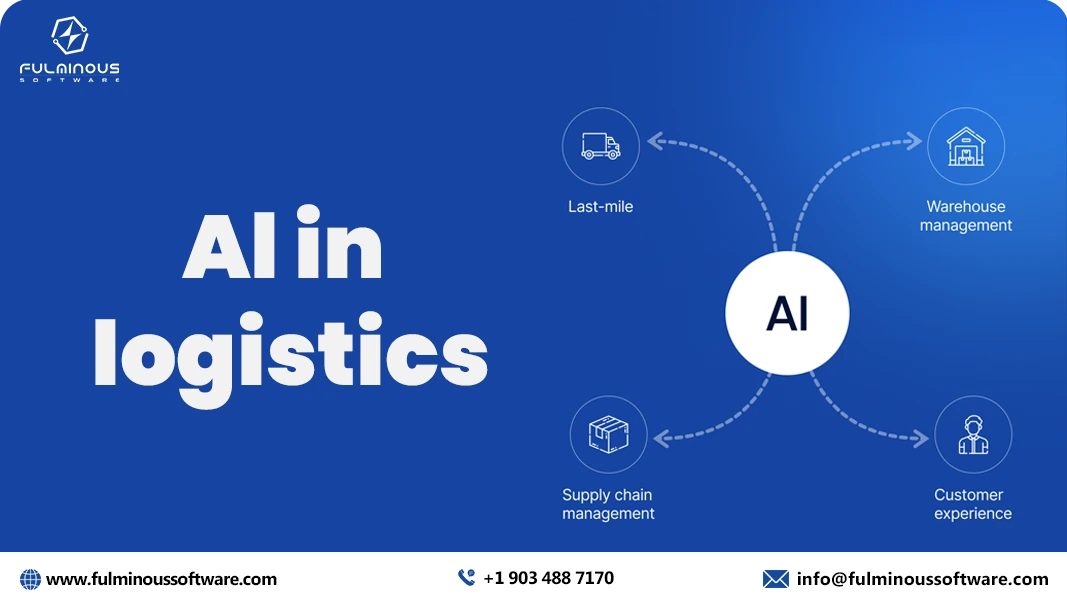
Artificial Intelligence (AI) is a valuable asset in the logistics industry, which helps to coordinate activities in multiple locations with precision, in which multiple individuals are involved. As the global logistics industry is demanding more innovative solutions, AI in logistics has a wide scope.
If you are thinking of adding AI to your logistics and supply chain business, here is the best guide for you. Here we will see the core concept, the use, benefits, cost, development steps, and many more important concepts of AI in the logistics and supply chain industry.
Table of Contents
- 1. Artificial Intelligence in Logistics Industry: Core Concepts
- 2. The Role of Generative AI
- 3. Use of AI in Logistics Industry
- 4. Benefits of AI in Logistics
- 5. Generative AI in Logistics Industry: What’s New?
- 6. AI in Logistics Cost: Feature-Wise
- 7. AI in Transportation and Logistics: Industry Example
- 8. Challenges, Limitations, and Their Solutions
- 9. Integrate AI in Logistics with Fulminous Software
- 10. Why Choose Fulminous Software?
- 11. Conclusion
- 12. FAQs
Artificial Intelligence in Logistics Industry: Core Concepts
Artificial intelligence in logistics is all about helping your business activities and machines to make use of artificial intelligence to bring maximum efficiency with minimum errors.. These include:
- Automated Planning in which AI predicts shipment volumes, helps in warehouse slotting, and allocates transportation resources.
- Real-Time Optimization in which algorithms that continuously adjust delivery routes, inventory restocking, and resource allocation.
- Robotics & Automation, in which smart robots pick, pack, and move items in warehouses, increasing speed and reducing errors.
- Predictive Analytics, in which AI analyzes historical and live data to forecast demand, delays, or risks.
The Role of Generative AI
Generative AI is an advanced type of AI that goes beyond basic tasks. In logistics, it helps by simulating supply chain issues, creating backup plans, and generating better strategies for routing, managing workers, and handling inventory.
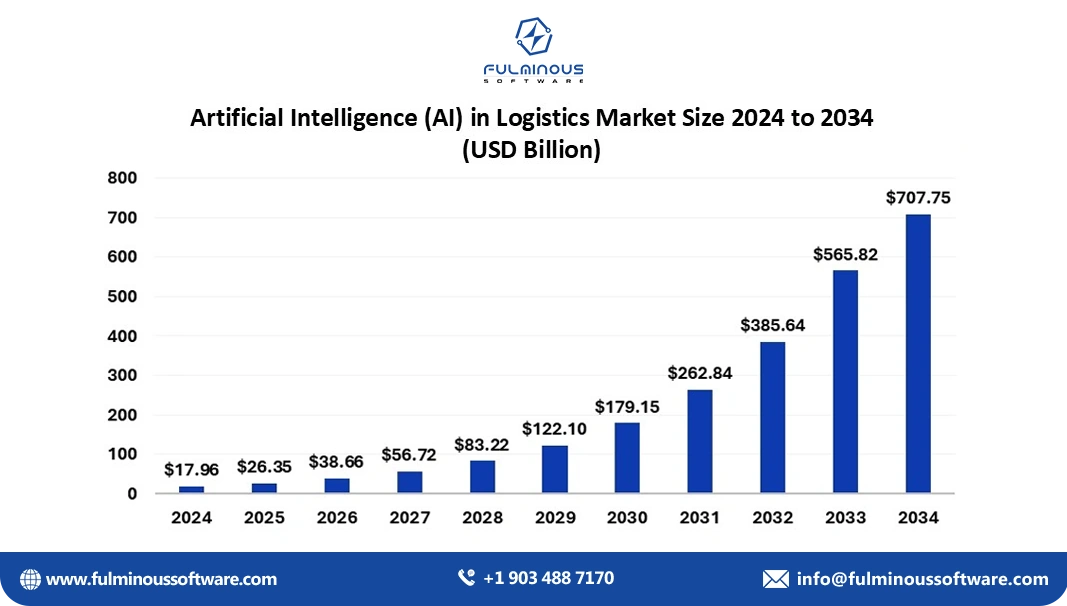
Use of AI in Logistics Industry
AI in the logistics industry has an important role to play in all the activities of logistics and supply chain, including goods movement, safety during movement, data management, operations scale, and meeting growing customer demands.
Demand Forecasting & Inventory Optimization
You can use AI to get real-time data (sales, weather, market trends) to forecast product demand so that you can manage inventory, reduce overstocking, and minimize stockouts.
Route Optimization
Machine learning dynamically provides you with accurate calculations for the best delivery routes, reducing fuel use, improving on-time delivery, and minimizing carbon emissions.
Warehouse Automation
When you integrate AI-powered robots in a warehouse, they work like a skilled employee in picking, packing, restocking, and tracking tasks. So that you can cut labor costs with maximum accuracy.
Predictive Maintenance
AI models detect potential issues in vehicles or machinery of your logistics business, so that you can get into action before breakdowns, preventing delays and reducing repair expenses by 20–30%.
Supply Chain Visibility & Anomaly Detection
Artificial intelligence in transportation industry enhances tracking of shipments and assets with automated alerts. This will be useful to find temperature fluctuations, route deviations, or security breaches and act on time.
Customer Service & Communication
Another major use of artificial intelligence in transportation industry is that Chatbots powered by AI provide. With AI chatbots in logistics, you can provide real-time updates on delivery status, handle rescheduling, and answer customer queries 24/7.
Workforce Planning
You can also use AI for workforce planning of logistics business activities. AI predicts logistics workloads and helps schedule labor more efficiently and balancing shift demands.
For more clarification, see this table:
| Logistics Stage | AI Use Cases |
|---|---|
| Procurement |
|
| Inventory Management |
|
| Warehousing |
|
| Order Management |
|
| Transportation |
|
| Last-Mile Delivery |
|
| Customer Service |
|
| Returns Management |
|
| Maintenance |
|
| Sustainability |
|
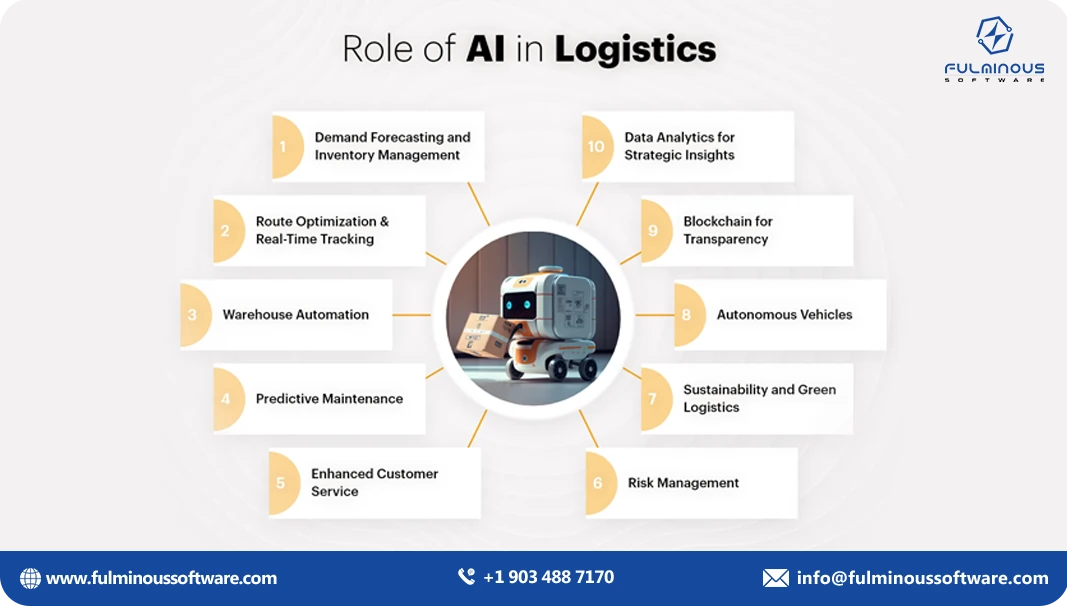
Benefits of AI in Logistics
Seeing the use cases of artifical intelligence in logistics industry, you can imagine the benefits of integrating artificial intelligence in the logistics and supply chain businesses.
Better Customer Service
The success of your logistics business lies completely in the satisfaction of the customer. AI integration is the best way to make your customers happy with on-time, safe, and accurate delivery
Lower Costs
AI helps reduce overall logistics and warehouse costs in multiple ways, including:
- Automating tasks
- Saving money on labor
- Saving money on Fuel
- Cutting down the operation costs.
Faster Deliveries
When AI comes into action in your logistics business activities, it has better plans for delivery routes and schedules. All these can result in making sure goods reach customers quickly and with higher accuracy.
Smarter Inventory
Inventory management is one of the major challenges that the logistics business faces. Overstocks and a lack of stock both affect business. But AI handles your inventory management and keeps your warehouses stocked with the necessary stock always.
Less Waste
In a scenario where businesses have responsibility in minimizing waste, Smart planning with AI cuts down on packaging waste and energy use. So that your logistics business operations become more eco-friendly.
Boosted Productivity
If you are facing low productivity of your workers and regular human errors, artifical intelligence in logistics industry handles repetitive tasks like data entry or scanning, freeing up workers to focus on more important jobs.
Fewer Accidents
When it comes to moving goods, a single accident can cause vehicle damage, goods damage, and issues in brand trust. Logistics AI monitors driver behavior and road conditions, so as to minimize the chances of accidents and keep people and goods safer.
Real-Time Updates
In the current scenario, users always track the location of their products. Not only for users, AI gives instant updates on shipments and operations to managers as well. So that they can make fast, smart decisions when things change.
Improved Planning
Proper planning is the key in the logistics business, which traditionally needs many proficient professionals. But now, you can leave all the planning tasks to AI so it analyzes trends and patterns to improve planning for staffing, shipping, and inventory.
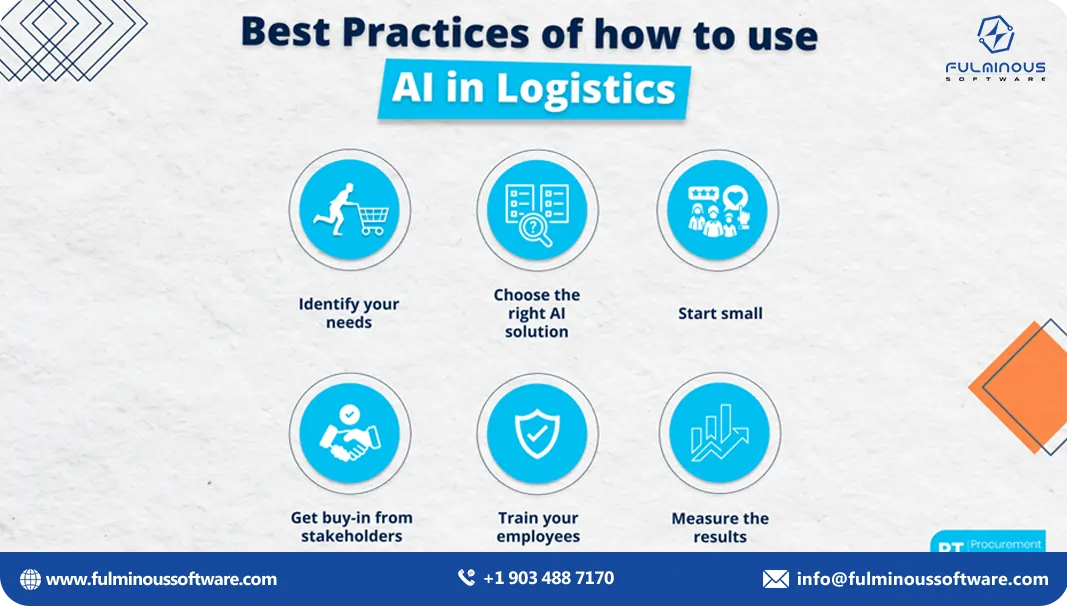
Generative AI in Logistics Industry: What’s New?
There are many new updates on Generative AI in logistics industry that bring more capabilities for logistics businesses:
- Scenario Simulation: What happens if a port closes unexpectedly? Generative AI can simulate alternate routes in seconds.
- Optimized Solutions: It can design new routing models, suggest packaging ideas, or recommend a warehouse structure.
- Automated Documentation: Generative AI can quickly generate shipping labels, customs forms, and delivery notes that reduce paperwork errors.
- Customized Customer Communication: AI can draft personalized delivery updates, delay alerts, or support responses.
AI in Logistics Cost: Feature-Wise
The cost to add AI in logistics industry operations depends on the feature you choose.
| AI Feature | Estimated Cost (USD) |
|---|---|
| AI-Powered Route Optimization | $10,000 – $30,000 |
| Demand Forecasting Engine | $15,000 – $40,000 |
| AI Chatbots for Customer Support | $5,000 – $15,000 |
| Smart Warehouse Management | $20,000 – $70,000+ |
| Predictive Maintenance System | $10,000 – $25,000 |
| AI for Real-Time Shipment Tracking | $8,000 – $20,000 |
| Returns Management Optimization | $7,000 – $18,000 |
| Fraud Detection in Orders | $8,000 – $12,000 |
| Sustainability & Emission Analytics | $10,000 – $22,000 |
| Robotic Process Automation (RPA) | $12,000 – $30,000 |
AI in Transportation and Logistics: Industry Example
Case Study: DHL’s Use of AI in Transportation and Logistics
DHL is a leading brand in the global logistics and supply chain industry.

Challenges Faced by DHL Before AI Implementation
- Inefficient Route Planning: Delays, extra fuel costs, and lower productivity.
- Rising Operational Costs: Over expenses on labor, fuel, and admin.
- Limited Real-Time Visibility: Hard to monitor shipments live.
- Inaccurate Demand Forecasting: Overstocking or understocking of goods.
- Customer Service Overload: Struggled to handle growing customer queries
- Paper-Based & Manual Processes: Too many repetitive tasks like billing and documentation.
- Poor Equipment Maintenance Planning: Breakdowns led to unexpected downtimes.
- Scalability Issues: Couldn’t handle growing logistics demands.
AI Implementation
DHL adopted AI technologies across several operations:
- Route Optimization
- Demand Forecasting
- Chatbots & Virtual Assistants
- Robotic Process Automation (RPA)
- Predictive Analytics
Results
- 15% Reduction in last-mile delivery costs.
- 40% Improvement in customer response times.
- 95% Accuracy in demand forecasting
- Reduced overstock by 25%.
- 60% Faster invoice processing
- Significant Emission Reduction.
The implementation of AI transformed DHL's logistics operations
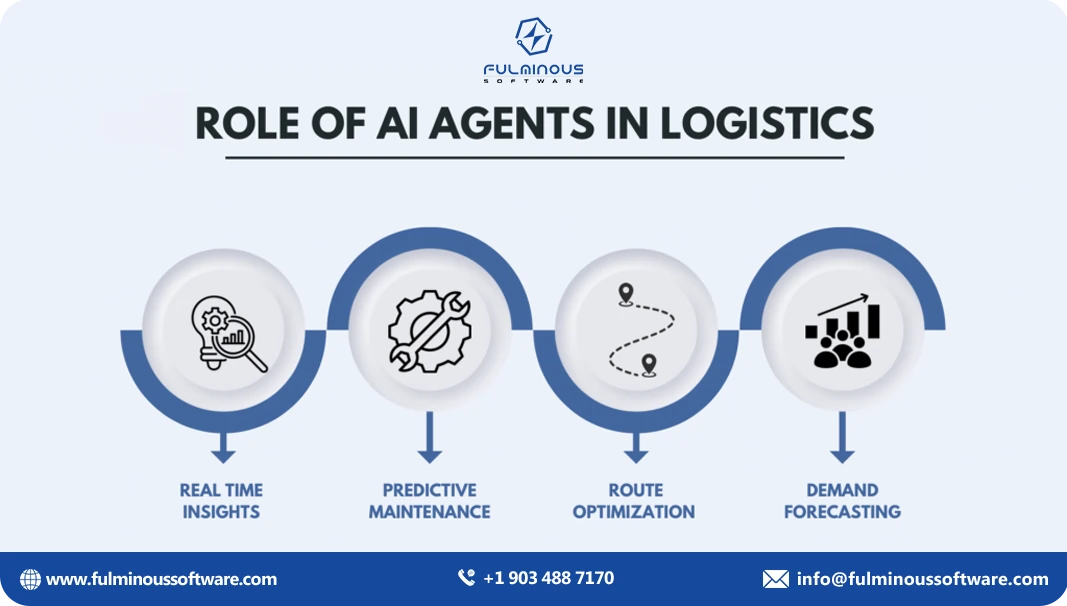
Challenges, Limitations, and Their Solutions
There are some challenges in logistAI, including:
| Challenge | Solution |
|---|---|
| Data Privacy & Security | Use encryption and follow data laws |
| Legacy System Integration | Connect using APIs or gradual upgrades |
| Workforce Impact | Train staff and support job shifts |
| AI Bias and Trust | Use clean data and review AI decisions |
| High Implementation Cost | Start small, scale gradually, and use cloud tools |
| Lack of Skilled Talent | Hire experts or partner with AI vendors |
| Real-Time Data Handling | Use edge computing and fast data pipelines |
| Low Data Quality | Clean, label, and validate data regularly |
| Resistance to Change | Educate teams and show real benefits |
| Regulation & Compliance | Follow industry standards and audit AI use |
But when you hire a top AI development company, you can easily overcome these challenges.
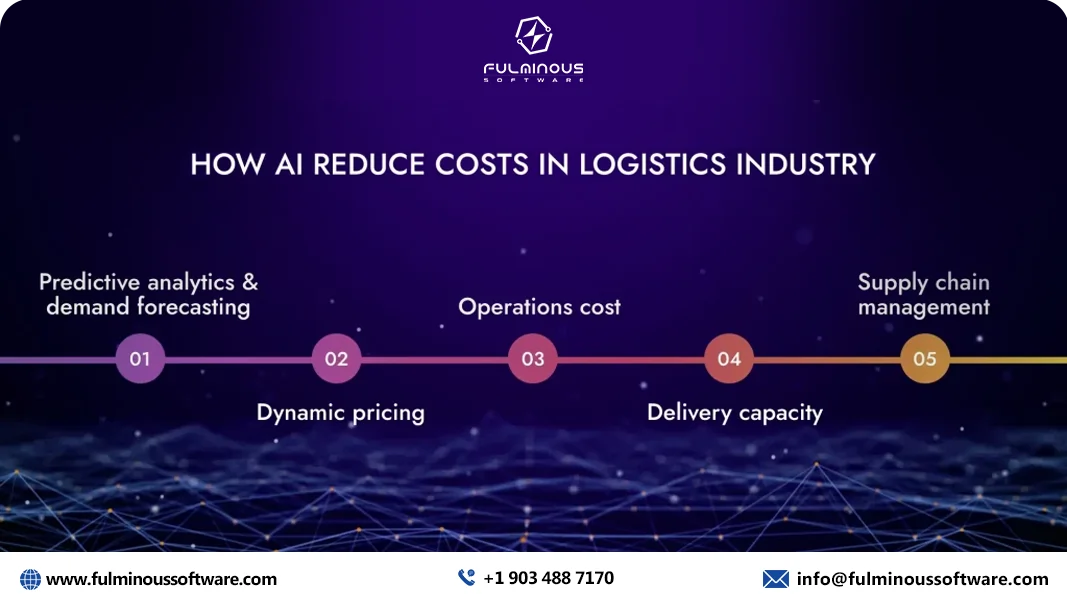
Integrate AI in Logistics with Fulminous Software
You have seen the various aspects of ai in logistics industry, including its benefits. Now comes the question of who can help you add AI to your logistics business. The answer is Fulminous Software. Fulminous Software is a leading logistics AI development service provider. Our services include:
- AI in Logistics Consultancy
- AI Development in Logistics
- AI-Based Route Optimization
- Predictive Demand Forecasting
- Smart Warehouse Automation
- AI Chatbots & Customer Service Automation
- Predictive Maintenance
- Returns & Reverse Logistics Optimization
- Fraud Detection & Risk Analysis
- Sustainability Tracking
Why Choose Fulminous Software?
There are many reasons that make Fulminous Software the best choice for AI development services for logistics.
- Affordable Services: Fulminous Software offers affordable AI solutions for logistics and supply chain businesses.
- Top Experience: The team at Fulminous Software is experienced in handling projects in both AI development and the logistics business.
- Tailored AI Solutions: Fulminous Software crafts unique AI solutions for each logistics company after studying their goals and users.
- Integration Expertise: We integrate AI solutions with your ERP, WMS, CRM, and legacy systems.
- Proven Results: We've helped logistics businesses cut costs by up to 30% and boost delivery efficiency by 50%.
- End-to-End Support: Fulminous Software offers complete solutions for AI in logistics and supply chain industries.
- Happy Clients: All our projects in logistics AI development are successful, and clients praise our services.
- Scalable & Cloud-Ready: We provide solutions that easily scale AI infrastructure powered by AWS, Azure, or Google Cloud.
Conclusion
The rise of AI in the logistics industry is a positive sign for logistics business. Wise logistics businesses have already started their effort to integrate the best AI solution into their logistics business. If you are dreaming of great success in the logistics business, you have only one choice- integrate AI.
You can also integrate AI in your logistics business, and your hr business can grab the unlimited benefits. Fulmnous Software is here to help you in integrating AI into your logistics business at an affordable cost. You can hire our AI development team for any level of AI integration. Contact us now! Share this article.
FAQs
Q1. What is the role of AI in the logistics industry?
AI in the logistics industry streamlines operations through automation, real-time tracking, and predictive analytics—making global supply chains smarter and faster.
Q2. How much does it cost to integrate artificial intelligence in logistics industry operations?
The cost of implementing artificial intelligence in logistics industry processes varies by feature—from $5,000 for AI chatbots to $70,000+ for full warehouse automation.
Q3. How can AI be used in the shipping industry?
AI can be used in the shipping industry for route planning, cargo tracking, fuel optimization, predictive maintenance, and automated documentation.
Q4. What are the benefits of AI in logistics?
The key benefits of AI in logistics include cost savings, faster deliveries, smarter inventory management, better customer service, and reduced environmental impact.
Q5. What is generative AI in logistics industry and how is it used?
Generative AI in logistics industry simulates disruptions, creates optimized delivery strategies, automates paperwork, and personalizes customer communication—enabling faster decision-making.
Q6. Why should I choose Fulminous Software for AI in transportation and logistics?
Fulminous Software offers tailored AI solutions for the transportation and logistics sector, with proven success in boosting efficiency and cutting operational costs.

 Verified
Expert in Software & Web App Engineering
Verified
Expert in Software & Web App Engineering
I am Manish Kumawat, co-founder of Fulminous Software, a top leading customized software design and development company with a global presence in the USA, Australia, UK, and Europe. Over the last 10+ years, I am designing and developing web applications, e-commerce online stores, and software solutions custom tailored according to business industries needs. Being an experienced entrepreneur and research professional my main vision is to enlighten business owners, and worldwide audiences to provide in-depth IT sector knowledge with latest IT trends to grow businesses online.
Partner with Top-Notch Web Application Development Company!
Discuss your Custom Application Requirements on info@fulminoussoftware.com or call us on +1-903 488 7170.
15 Days Risk-Free Trial

